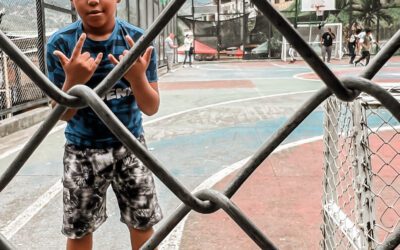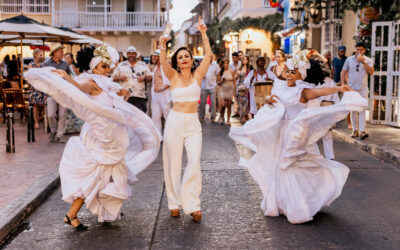
Shop like a Colombian
Colombia is a recent phenomenon in the travel community – drawing pilgrims in hordes, due to its beautiful landscape, warm yet modern culture, and of course – affordable prices.
While the first thing we tend to do in a country whose purchasing power pales in comparison to ours is to book a luxe hotel and make a res at a fancy dinner spot (which I highly recommend), another activity that just makes sense here is shopping.
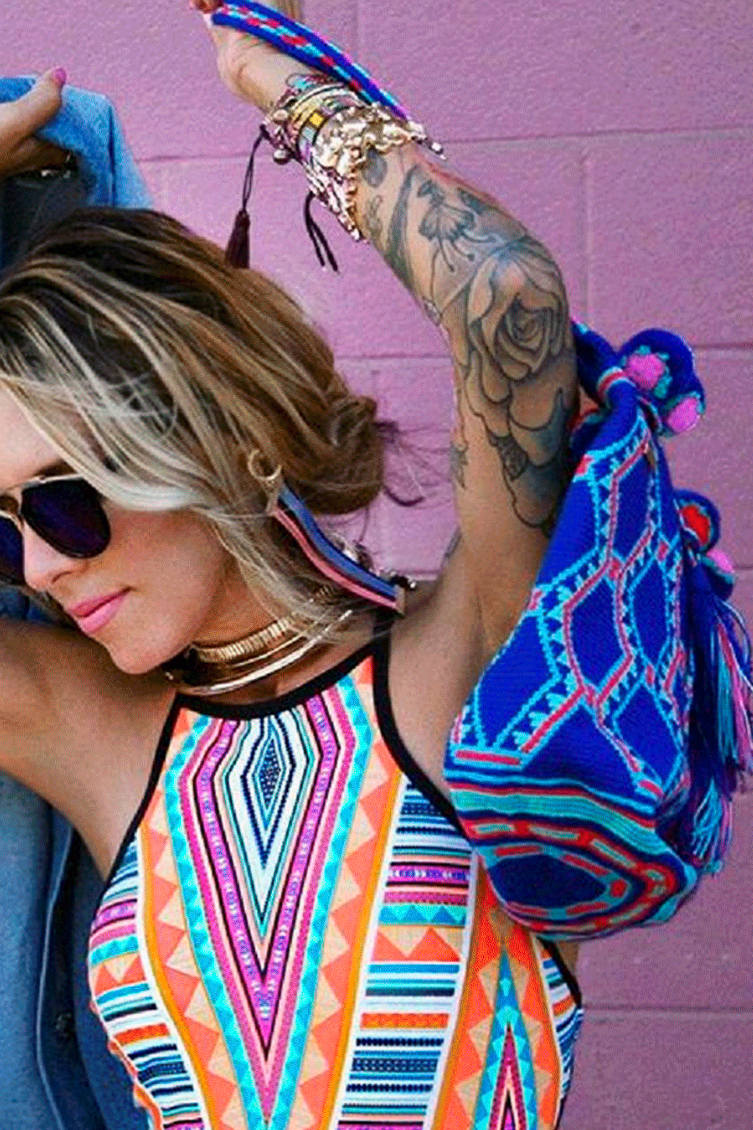
So what are the best souvenirs to buy in Colombia? As with anywhere, we want to look at what their comparative advantages are, what natural resources they have, and what they consider their “specialty.”
For Colombia, this means taking advantage of their strong textile and fashion industries. And their reputation as a notably artistic culture means that they put a lot of care into making things beautiful – just what we’re looking for.
So what are the 13 Best Souvenirs and Gifts to Buy in Colombia in 2025?
#1 Colombian Coffee
Colombian coffee is a low-hanging fruit when looking for souvenirs. World-famous for having exceptional quality and flavor, you know this gift is going to be much appreciated and will actually get used.
How to get the best Colombian coffee
-
The best coffee beans to buy in Colombia may vary by preference, but the country is known for its Arabica beans, which have smooth, nuanced flavors.
-
Look for coffee labeled as “single-origin,” which means it’s sourced from a specific region or even better – a single farm.
-
Buying whole coffee beans helps retain freshness until you’re ready to grind and brew.
-
Look for labels “Colombian Coffee Origin Denomination” or “Café de Colombia.”
Where to buy Colombian coffee
If you’re serious enough about Colombian coffee to make your destination about it, visit the Coffee Triangle. This region includes towns like Armenia, Manizales, and Pereira and is known for its lush coffee farms and scenic landscapes. You can visit coffee farms like Hacienda Venecia or El Ocaso and purchase coffee directly from the source.
If you’re in Medellin, and not planning to trek 6 hours on a bus to get your coffee experience, try Pergamino. Their artisanal coffee is high-quality and their drinks are amazing. The space is super cute, too – great place to chill out and people-watch while you get your caffeine fix. You’ll see a lot of digital nomads but also a lot of Colombians having business meetings or catching up during their 3-hour lunch break.
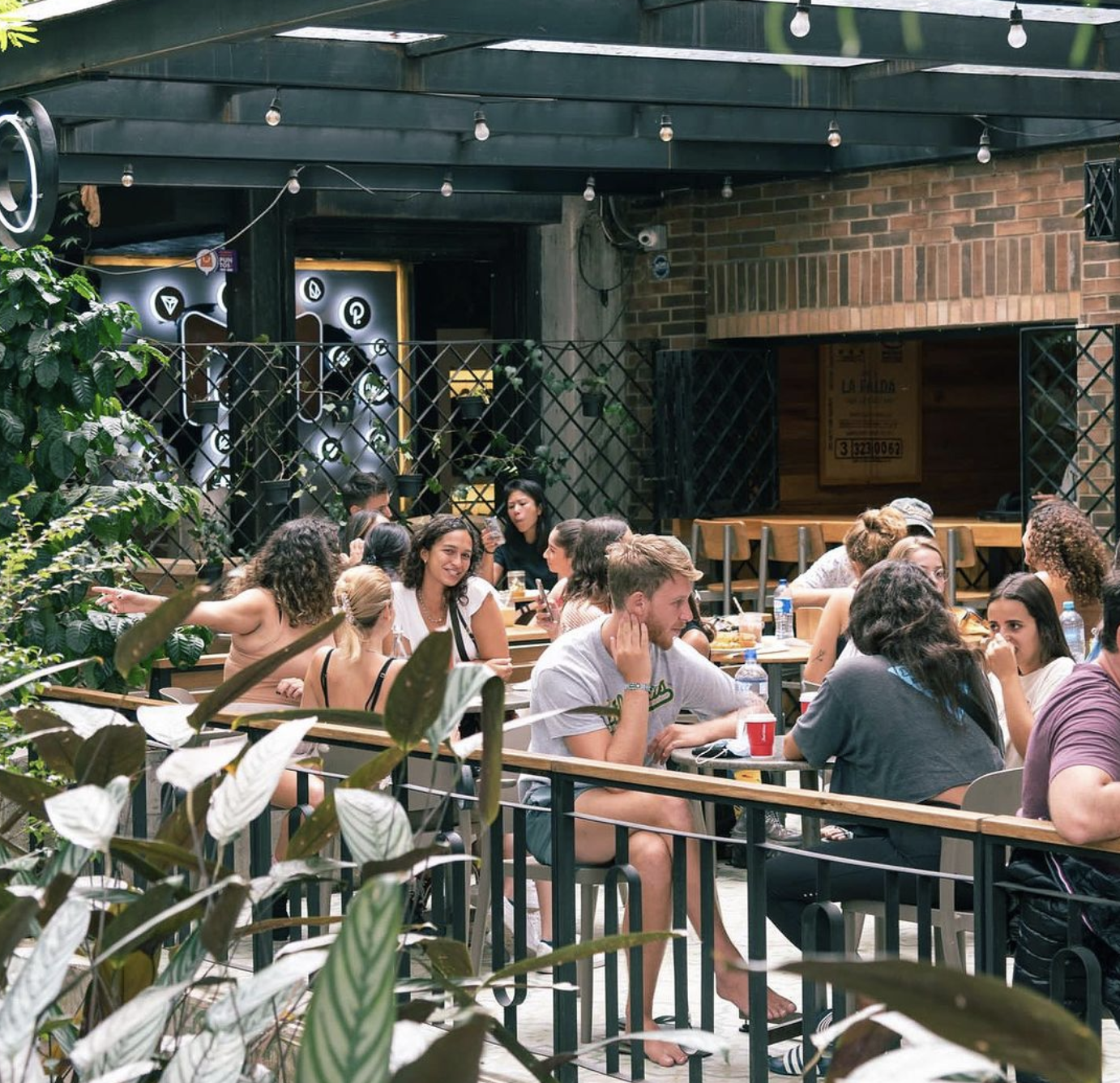
Another Colombian coffee experience that you should try is Juan Valdez. Not because it’s amazing, but because it’s a classic. It’s basically like Starbucks but Colombian. The farmer dude on the logo is a fictional character associated with the National Federation of Coffee Growers of Colombia and has become an iconic symbol of Colombian coffee production.
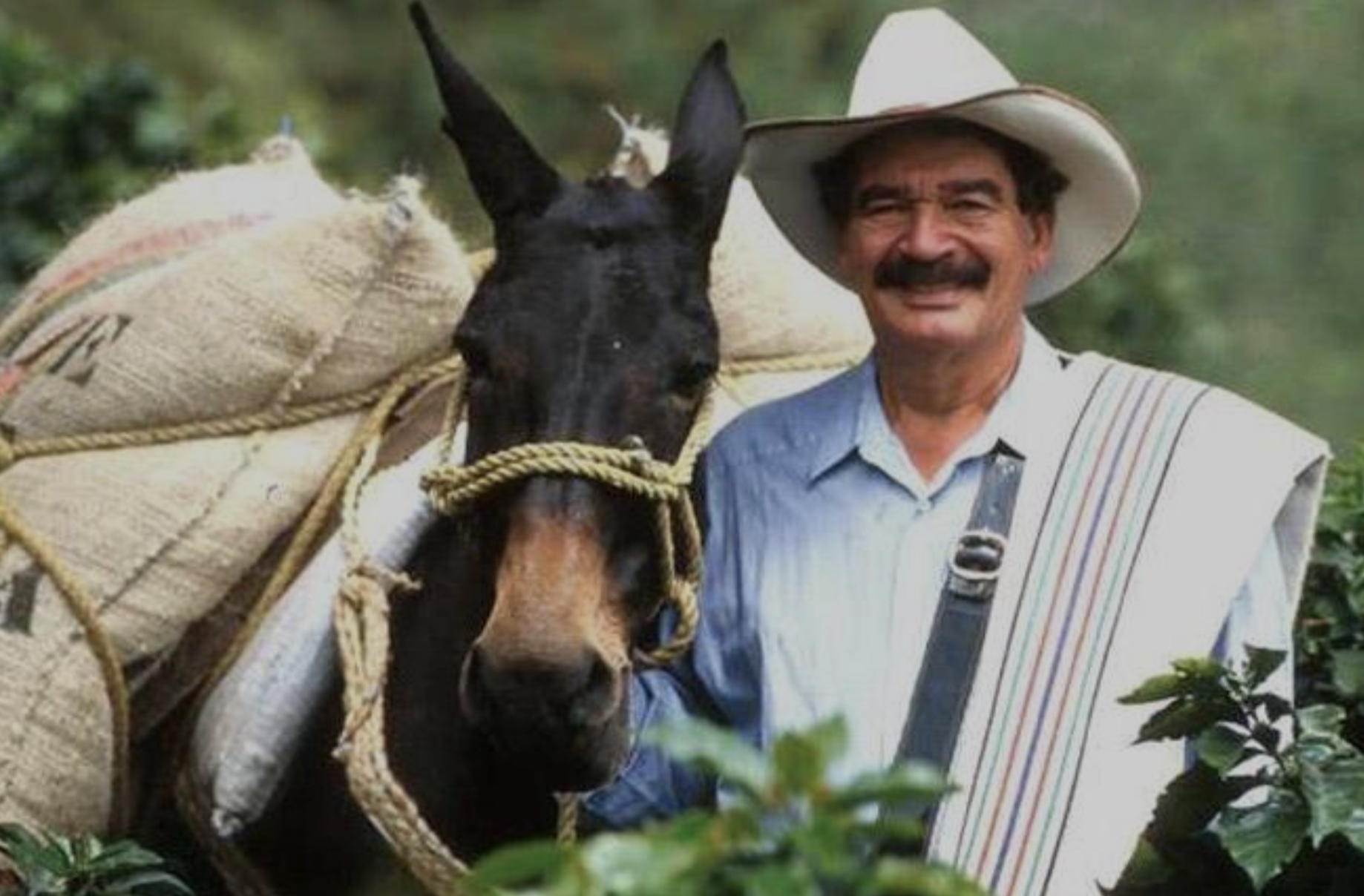
If you’re not satisfied with Pergamino and Juan Valdez but don’t want to go to the coffee region, apparently there’s a town near Medellín called El Retiro where you can explore coffee farms and purchase coffee, but I’ve never been.
How much does Colombian coffee cost?
Coffee is already a low-price point item, and in Colombia, it’s even cheaper. Expect to pay less than $10 for a 12-oz bag of supreme-quality coffee.
#2 Leather
Colombian leather products are celebrated globally for their exceptional quality, craftsmanship, durability, and style. Skilled artisans in Colombia have perfected the art of leather craftsmanship over generations, often using premium materials, including full-grain and top-grain leather, which are known for their strength and longevity.
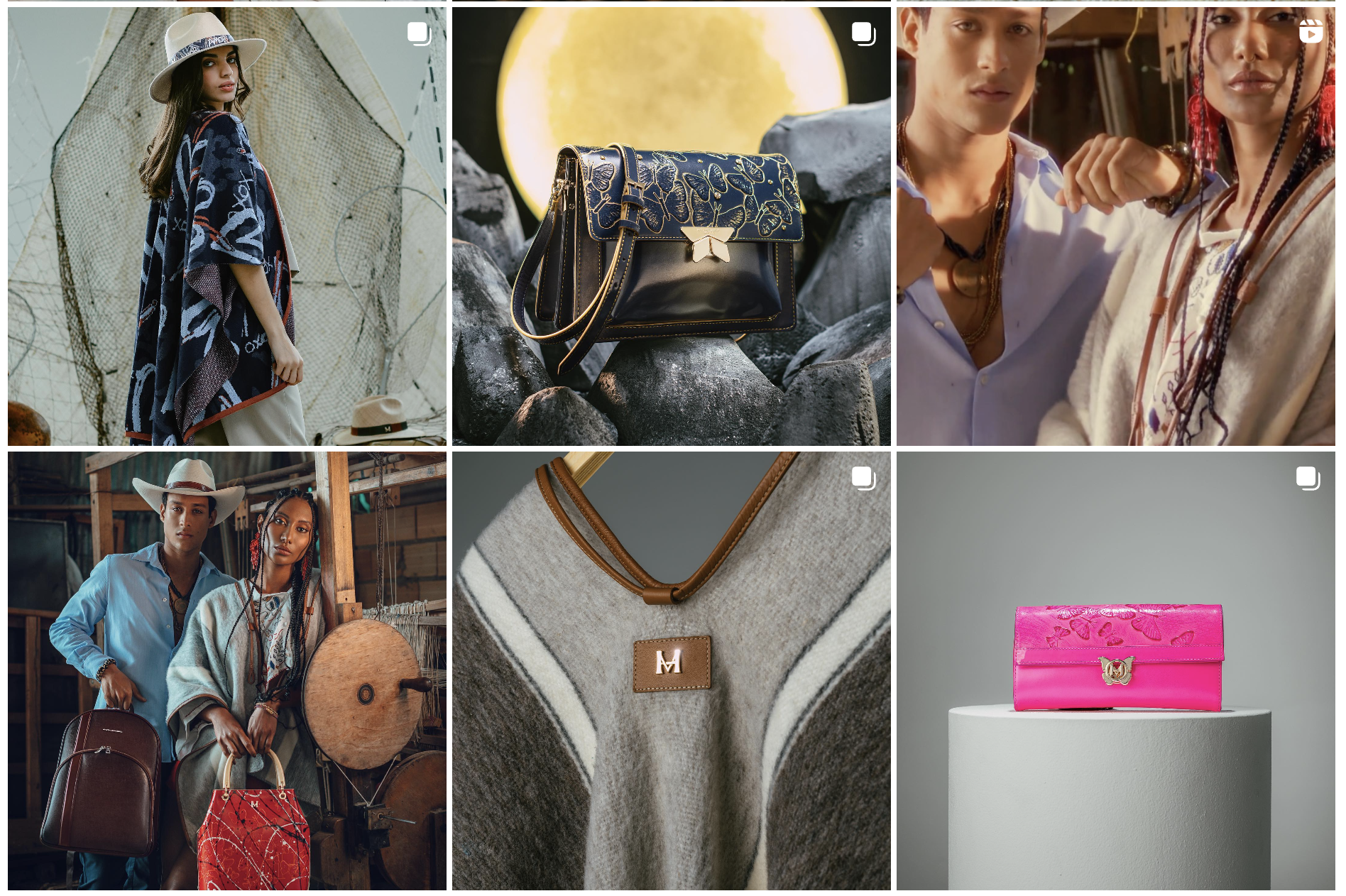
What Colombian leather products make great gifts?
-
Bags
-
Wallets
-
Shoes (finally, comfort meets style)
-
Belts
Which Colombian leather brands should I buy?
-
Cuero & Caña
Vélez is my personal favorite Colombian brand and I spend way too much time in this store every time I go back. Their products are top-notch, stylish, and inexpensive compared to the US.
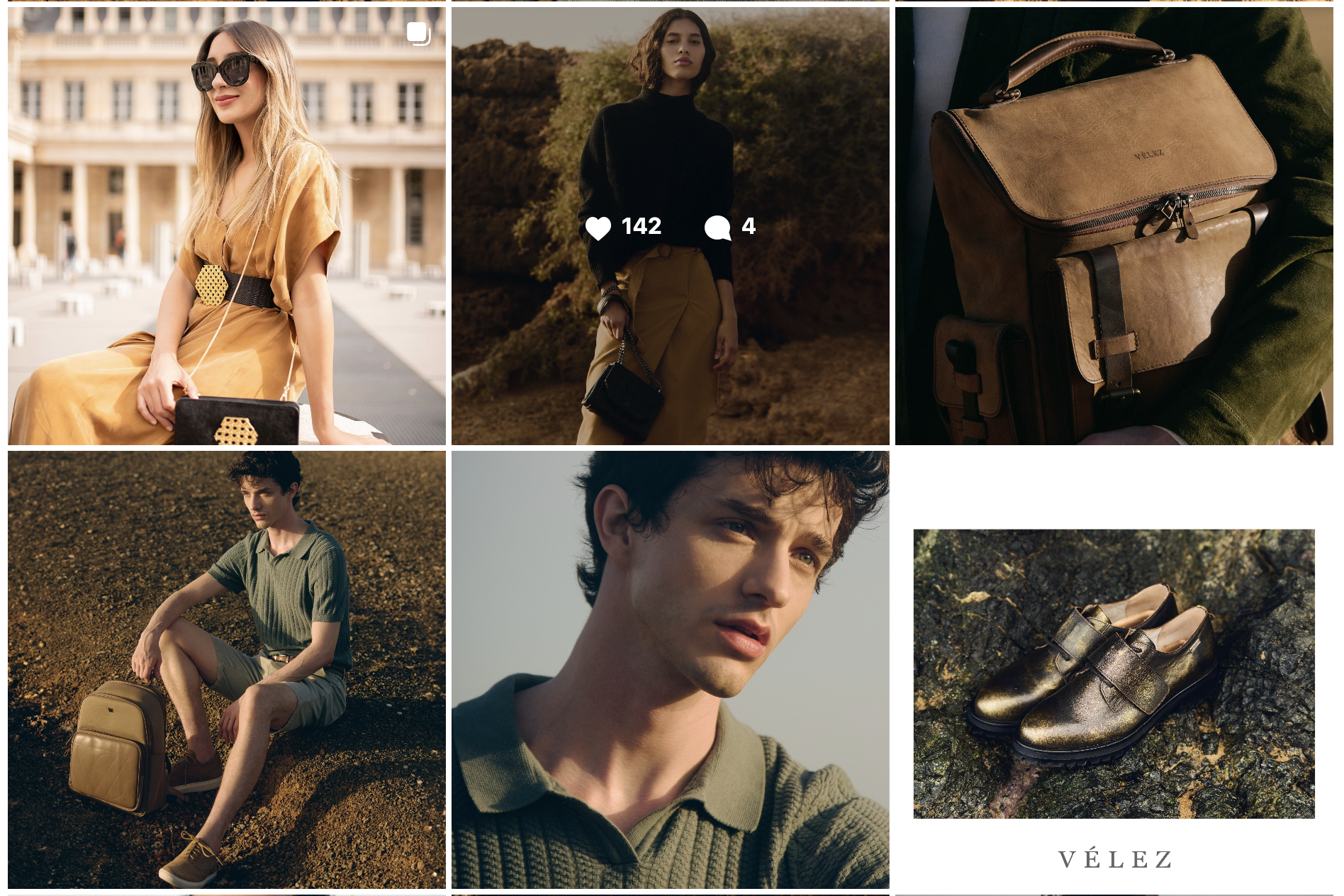
The brand’s designs often combine traditional craftsmanship with contemporary styles, making them popular both in Colombia and internationally. Also Juan Carlos Vélez was a pioneer in introducing vegetable-tanned leather to the Colombian market, which is cool.
A new development in the store is that they brought in a laser branding machine, which I definitely got carried away with. But it’s a really fun way to personalize your goods – just maybe think about branding the interior instead of marking up your mint-condition leather products, like I did.
And make sure you buy this backpack:
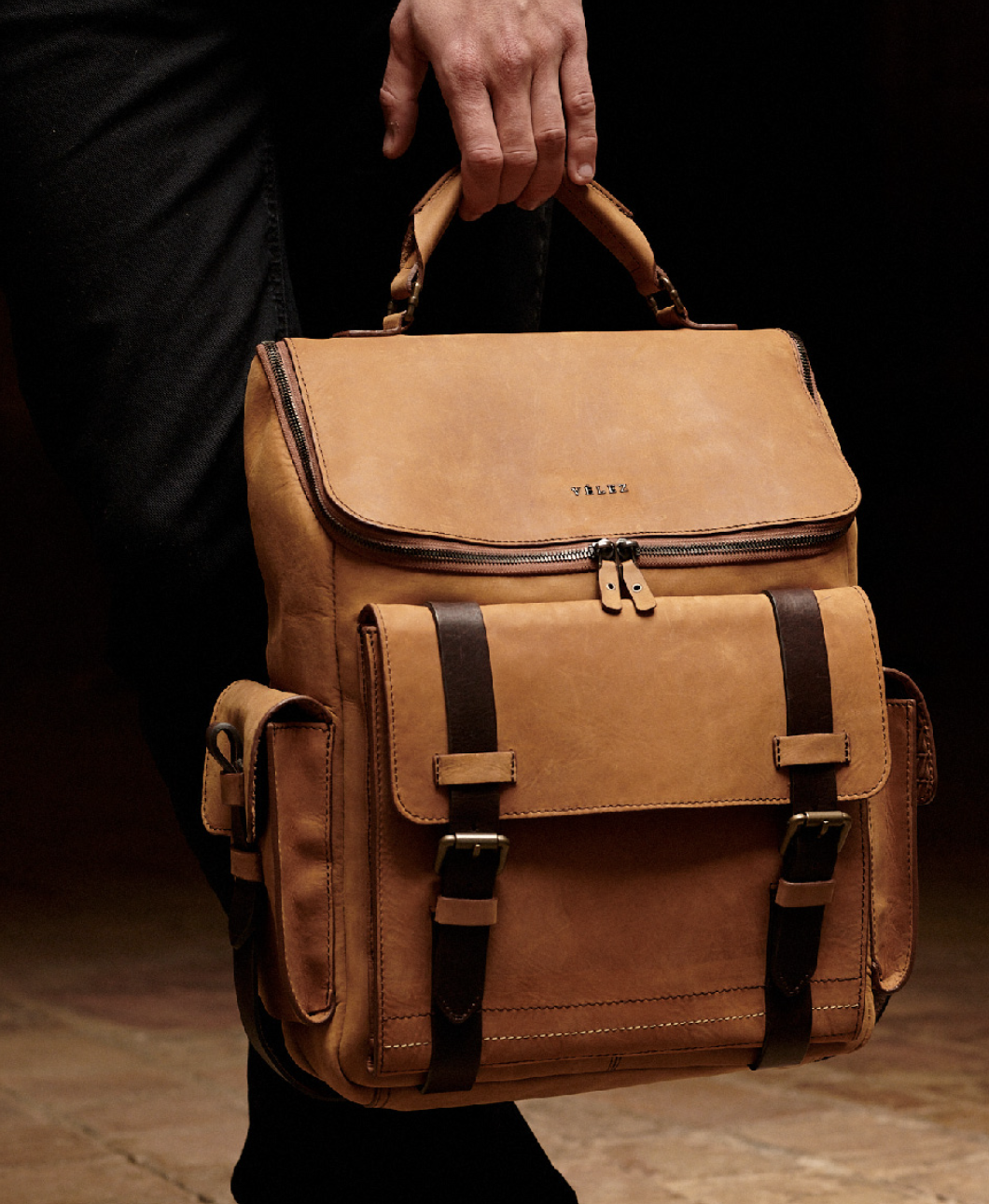
How much should you spend at Velez?
Honestly, if you’re in the market for some high-quality goods, you could easily spend $1,000 USD here. They have jackets, shoes, bags, wallets, and some really nice knitted sweaters and other fabric items.
#3 Gold Jewelry
Buying gold in Colombia is something I don’t know a ton about because I’m not a baller, and I don’t want to steer you the wrong way if you are. But I do buy gold-plated jewelry in Colombia and I love it. It’s affordable, plated usually on something like brass, which is nice but obviously heavier than pure gold. Brands Pajarolimon and Lina Echeverry are two of my favorites.
#4 Emerald Jewelry
Colombian emerald jewelry is internationally acclaimed for being some of the world’s finest, with stunning green hues, considered the most desirable shade in the gemstone world.
Emeralds also hold cultural significance in Colombia, with a history dating back to pre-Columbian indigenous civilizations. Much like the modern era, these rocks were treasured by indigenous tribes for their beauty and mystical properties. I don’t know if you’ve seen Encanto, but ‘Esmeralda’ – that’s Spanish for emerald.
Best places to buy emeralds in Colombia
-
Bogotá’s Emerald District: a hub for emerald trading and has some reputable jewelry stores. Start your search in La Candelaria.
-
Cartagena: You can find reputable jewelry shops that specialize specifically in Colombian emeralds in Cartagena. You’ll know them when you see them and pro tip: don’t buy emeralds from the guys on the street who sell them on the street out of janky wooden briefcases.
-
Ask for Recommendations: Ask tour guides, friends, or even Colombians that you meet while you’re there how to buy emeralds in Colombia. You’ll be surprised how much random Colombians know about their country’s industries.
Is it cheaper to buy emeralds in Colombia?
Not necessarily. Colombian emeralds are some of the highest quality in the world, and it is a global market so you won’t necessarily pay less in Colombia for the same quality emeralds you would find in the States or Europe. That being said, you do have the advantage of direct sourcing, which means you can cut the cost of the distributors.
#5 Wayuu bags
Have you ever seen those really colorful woven bags from Colombia? The ones with the vibrant colors and geometric patterns?

Well it turns out these bags are also steeped in culture from a very particular group of Colombians – the indigenous, Wayuu tribes, located in the La Guajira Peninsula on the northern coast of the country.
These bags, often referred to as “Mochilas,” (or mochila shoulder bags) take about a month to make(!)
They’re one of a kind, each one an expression of the women who created it, with their creativity and personal experiences infused into each unique design. Her dedication and precision, as well as the spiritual beliefs of the Wayuu community as a whole, are evident in every stitch.
If you’re in the market for a Wayuu mochila, please make sure you are buying from the Wayuu. Knock-offs are more readily available for purchase than the real deal so you’ll have to put some effort into it – but the hunt is part of the fun!
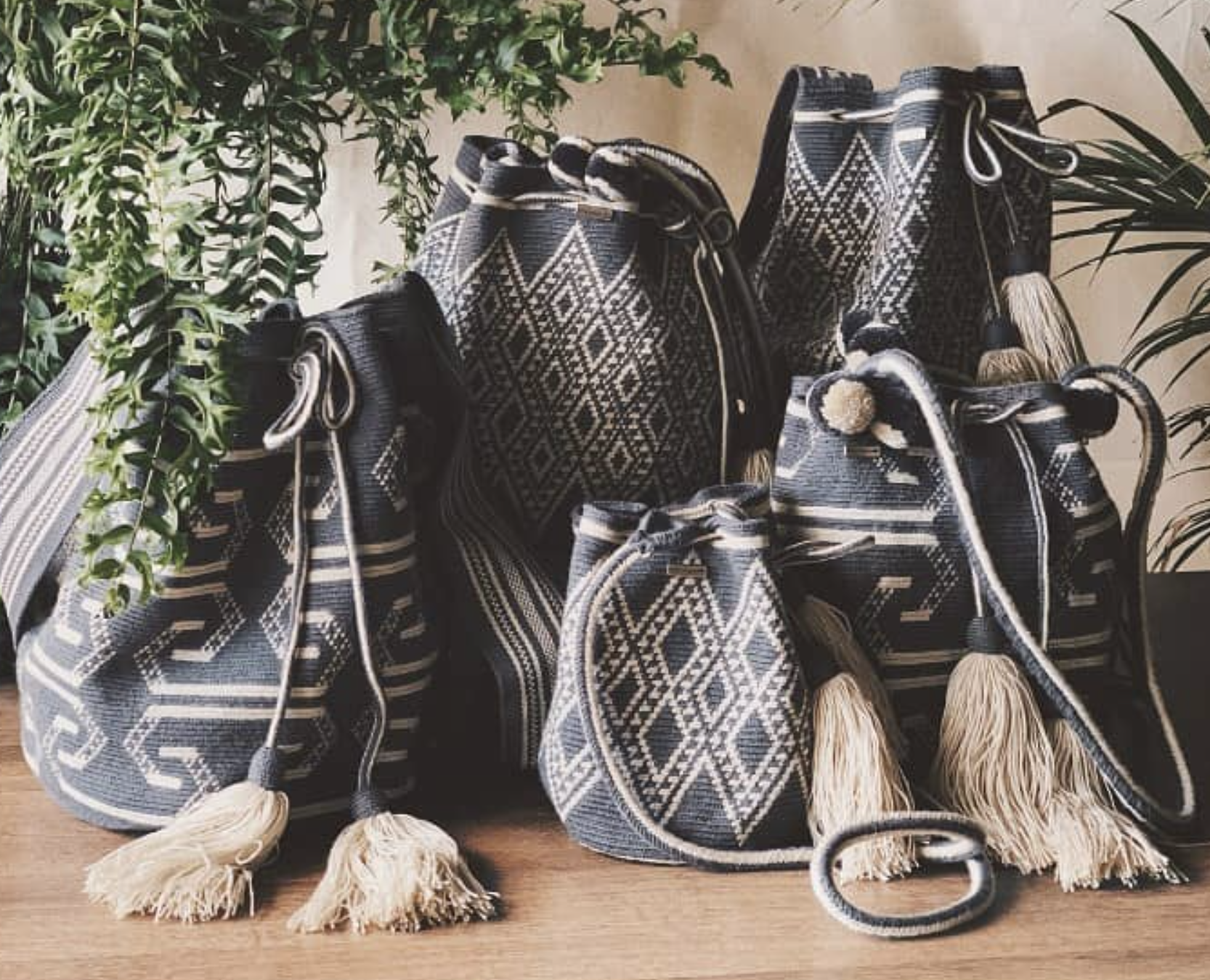
Where can you buy authentic Colombian mochilas:
The best place to find genuine Wayuu bags is in the La Guajira region, where the Wayuu people reside. But if you’re not down to factor a flight and a few days into the equation, check out the Hilo Sagrado Foundation.
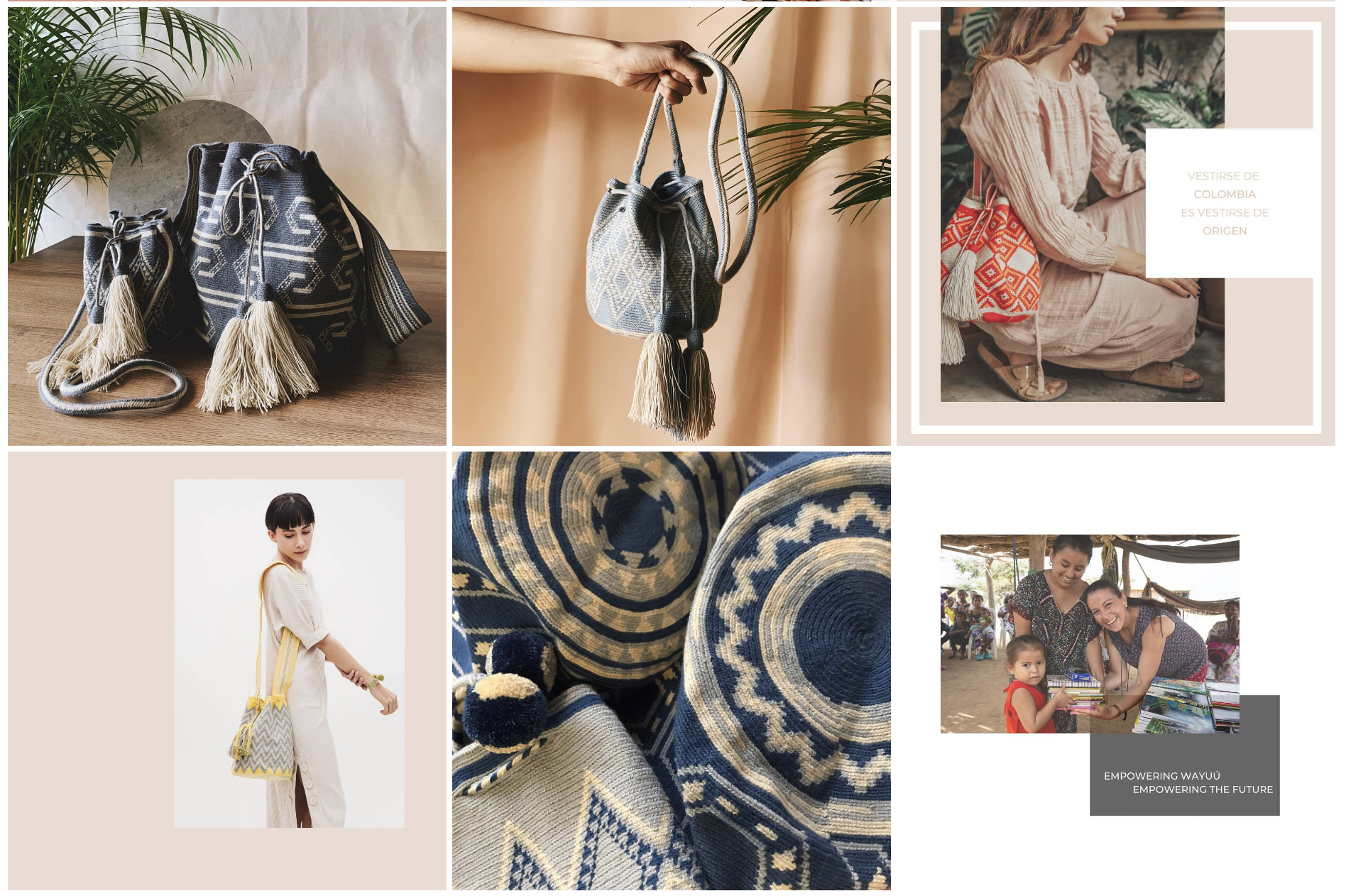
You can buy one directly from this non-profit that puts the money back into the community in the form of water (a resource that has sadly been stolen from the Wayuu by British and Australian mining companies). And I can personally attest to the fact that the foundation does what it says it does because I’ve gone on trips to La Guajira with them and we installed water together.
In the main cities like Cartagena, Bogotá, and Medellín, you can find boutiques and artisan shops that sell Wayuu bags – and if you can get to an Artsanías de Colombia you’re golden.
How much are mochila bags in Colombia?
While falsies of these bags are super cheap (like $7), they can get pricey if you want to make sure you’re getting the real thing, looking at more like $80-$130, depending on size.
#6 Parchita Bags
I tried to source Parchita for my clothing company that I set up in Colombia a while back, but they had a minimum so I just bought a few for myself. I LOVE them. They’re super unique, with industrial geometric shapes and beautiful bold colors. If you buy a Parchita and you see someone else with a similar bag, it’s also Parchita.
The owners are a husband and wife duo and either one or both of them used to be industrial designers, which makes perfect sense. They actually use PVC pipes in their bags, along with leather, and some other materials.
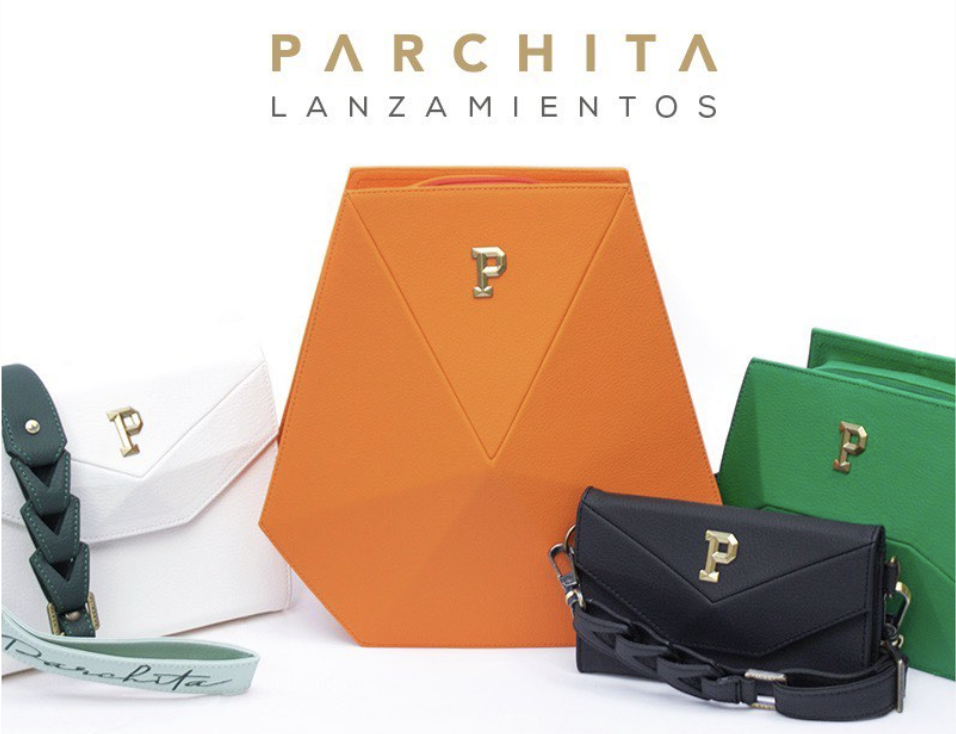
Where to buy Parchita
Parchita has a store in El Poblado, Medellín and Bogotá or you can order them online, but only to be shipped in Colombia.
How much are Parchita bags?
The Parchita website won’t let me on it from the US right now but I know that I paid about the same price for this beautifully designed bag as I would for a shitty 2000s Juice bag at Marshall’s.
#7 Sombrero Vueltiao - a Traditional Colombian Hat
If you’ve ever been to Colombia you’ve seen these being worn by street vendors hawking them.
But the Colombian sombrero vueltiao, or simple “vueltiao,” is an icon of Colombian culture and craftsmanship. It has an intricate woven design, typically in a black-and-white pattern, and the name refers to the fact that it can be worn in any direction (vueltiao means “turned” in Spanish), depending on what part of the hat you want to show off.
The vueltiao dates back hundreds of years, originating with the Zenu indigenous people of Colombia’s Caribbean region; representing unity, nature, and the harmonious coexistence of opposites. The sombrero vueltiao is officially recognized as a Masterpiece of the Oral and Intangible Heritage of Humanity by UNESCO, and it still makes for a really cool souvenir, with a very practical use.
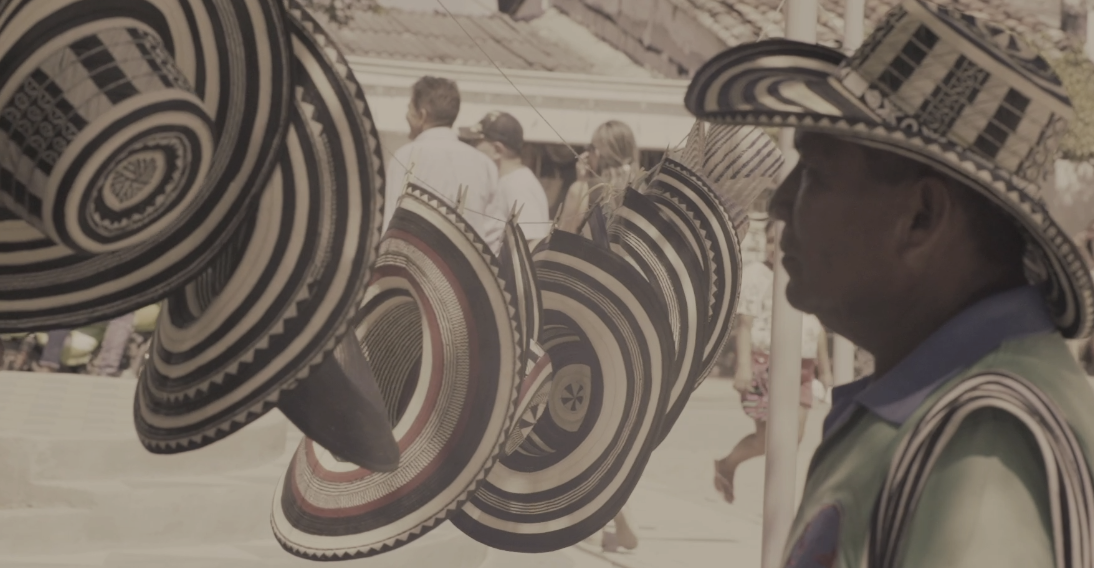
Where to buy a Colombian Sombrero Vueltiao:
As with the mochila, you will have no trouble finding cheap knock-offs in the stree, but quality over quantity, you know? Get the real thing. There are several places in Colombia where you can find them:
-
Artesanías de Colombia is in Bogotá and Cartagena and has real, authenticated Colombian crafts
-
If you’re in Cartagena you’re going to be inundated with falsies – don’t give in
-
Outside of the main cities, Tolú, is renowned for its sombrero vueltiao craftsmanship and will give you more opportunity to find real ones. You might even be able to witness artisans making them.
How much should you be paying for a Colombian sombrero vueltiao?
This is a super intricate craft of weaving palm leaves that has been passed down through generations and takes days or weeks to make so the price point is a little higher than most Colombian goods. Expect to pay upwards of $100 for a real Colombian sombrero vueltiao.
#8 Sombrero Aguadeño - another Traditional Colombian Hat
If you want to keep your dome in the shade while you’re on your holiday but aren’t flamboyant enough to rock the vueltiao, you’re in luck. The Aguadeño is the love child of the Panama Hat and the American Cowboy – and a work of art, in my opinion. This hat is so beautiful and encapsulates refinement and ruggedness perfectly.
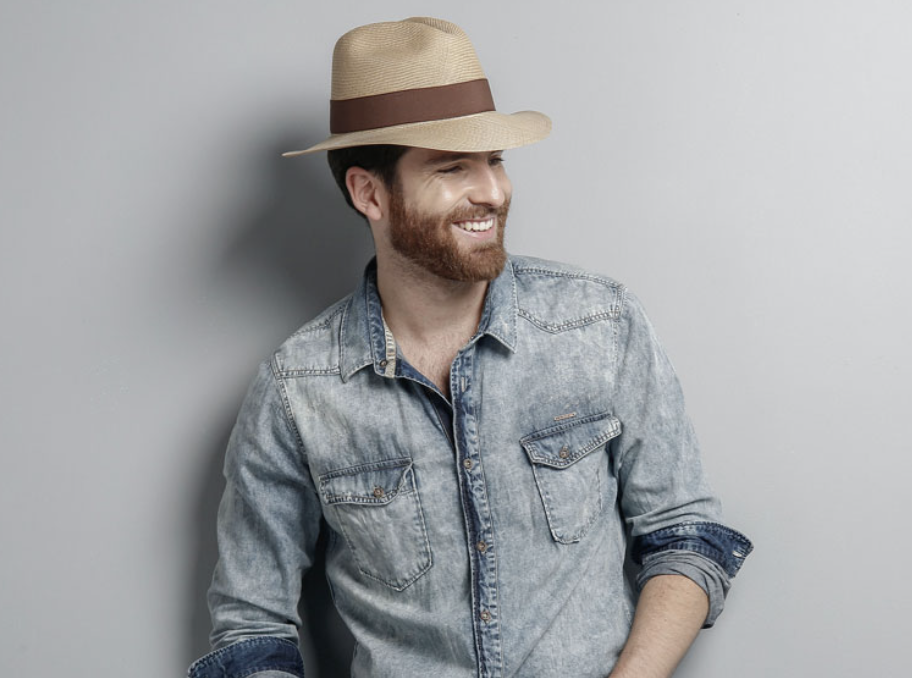
How to buy an Aguadeño Hat
The Aguadeño is associated with the town of Aguadas, located in the coffee-producing region of Caldas, Colombia. So now we have 2 reasons to go there. The real ones are made out of iraca palm leaves and you can find them for under $40. If you’re a fancy pants, however, might I suggest this rainbow Mario Hernandez with the M on the side:
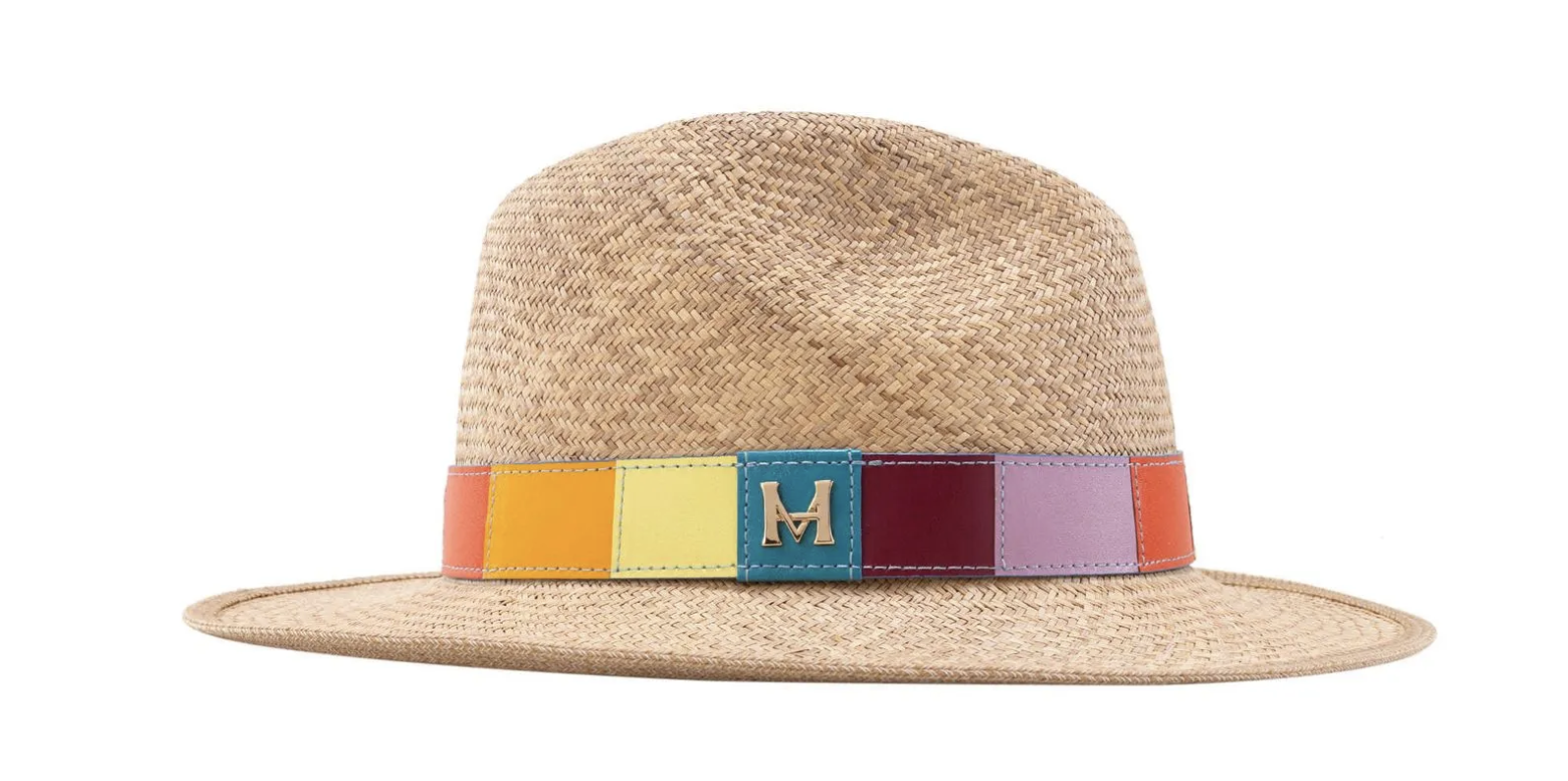
#9 Aguardiente - Colombia’s Favorite Liquor
Now for the fun stuff.
Aguardiente, often referred to as “guaro,” and meaning “firewater,” is the country’s beloved anise-flavored liquor. This clear spirit holds a special place in Colombian culture and is a key component of many celebrations and gatherings. When you visit Colombia you’ll notice people drinking on tiny plastic chairs, sometimes with pickled vegetables – that is Aguardiente.
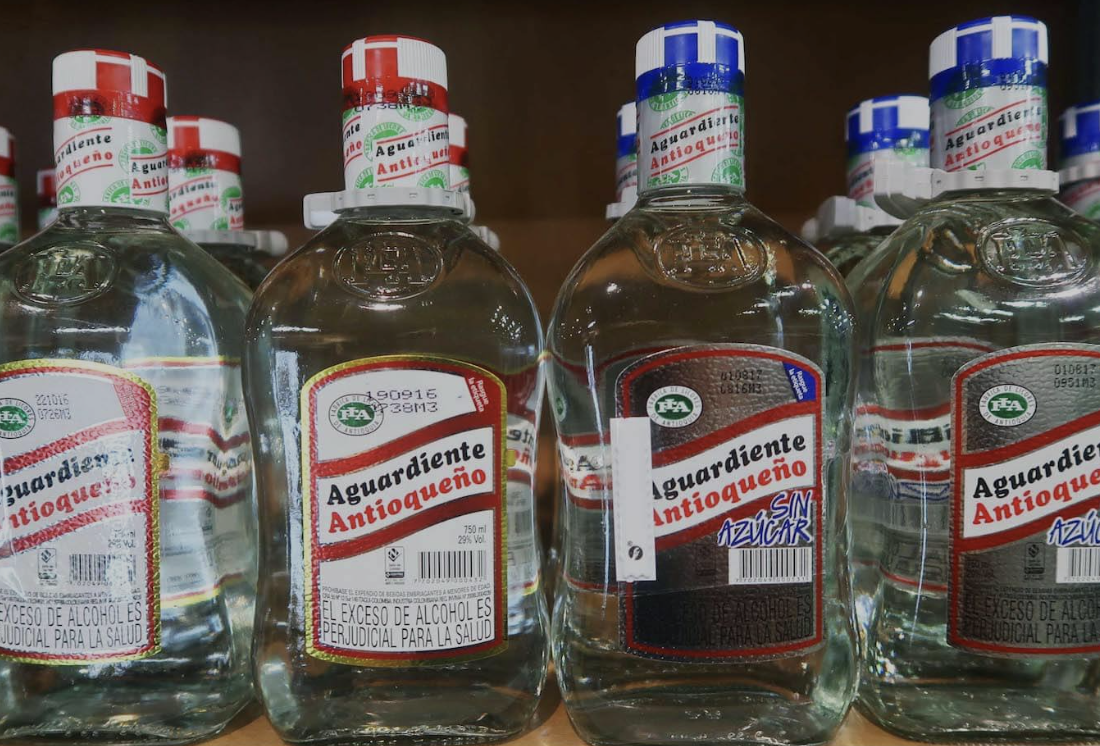
Aguardiente is flavored with anise, which gives it a distinct licorice-like taste. But don’t be put off by that – I hate black licorice. Like passionately. And guaro is one of the only alcohols that I can take shots of. Idk it’s weird.
Anyway, guaro is distilled from sugarcane juice or molasses, and seasoned with herbs and spices, including anise. The result is a spirit of about 30% to 60%.
Finding Aguardiente is easy. As with all alcohol in the country, guaro production and distribution are regulated by the Ministry of Health and Social Protection. So unless you’re shopping in a real back alley you’re safe to buy it wherever – and any market and liquor store you come across in Colombia will be stocked.
Some well-known brands are Antioqueño, Cristal, and Nectar, but they’re all the same. The only difference is that the blue cap is sugar-free, and whether that is a good or a bad thing is up for heated debate amongst Colombians.
You can also grab a bottle at the duty-free shop on the way out if you have any last-minute people to buy for or realize that you don’t want to be sober on your 3-hour flight to Miami.
Is there a top-shelf Aguardiente?
The Colombian states have a monopoly over all alcohol in Colombia so Aguadiente is pretty much standardized but I did just come across this “premium Aguardiente” brand called Cumbé. I wrote them and they said that they are a Colombian brand and that they sell in Colombia, as well as online to the States.
#10 Swimsuits
Another industry that is quintessentially Colombian, and actually very Paisa (Colombians from Medellin) is the swimwear industry. Colombian swimwear is popular both domestically and internationally – so much so, that I spent 3 years of my life trying to bring Colombian swimwear to the US.

What makes Colombian swimwear unique:
When I say ‘Colombian swimwear,’ what I really mean is bikinis. Colombian women spend a lot of time and money on their bodies and they want to show them off.
You’ll also find a lot of bathing suit covers. They don’t really cover a ton and they’re more like bikini accessories.
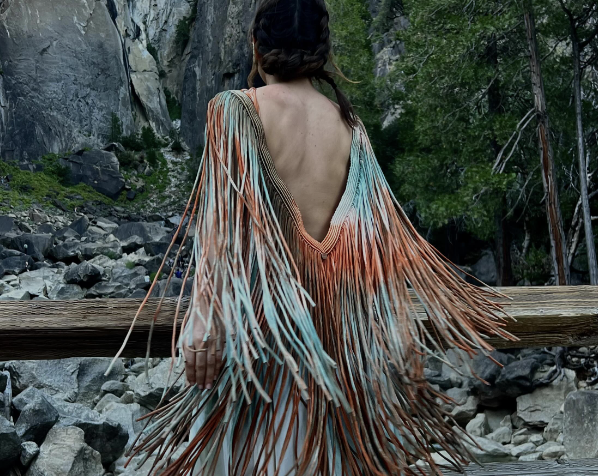
Colombian swimwear is celebrated for its quality, attention to detail, and innovative designs. It’s generally produced with high-quality materials and craftsmanship and produces swimsuits that are comfortable, durable, and stylish. Their colorful floral patterns are uniquely Colombian-looking, but recognizable after you’ve seen a few.
Another aspect of Colombian swimwear that I love is that they’re super environmentally and socially conscious. They pay fair wages and do what they can to reduce waste as a common practice.
Where to buy Colombian swimwear:
As far as cities go, Medellín is the fashion capital of Colombia and every girl you meet there has a bikini company. Literally all of my friends either have one, model for one, or do brand design for one. Any of Medellín’s 7 malls will have all the swimwear brands, and if you’re just walking around El Poblado, Laureles, or Sabaneta you’ll come across them.
Cartagena has just as many options (in a per-capita kind of way) as Medellin. The same brands are there, but just walk around the city and check it out for yourself because shopping is like the #1 activity to do in Cartagena.
What brands should I buy?
Agua Bendita, Maaji, Touché, Aleja Radi, and my FAVORITE – Entreaguas, are all super well-regarded.
Entreaguas in particular has a very Colombian style. Natalie Botero, the #girlboss owner, designer, and model of the company creates her macrame wearable art designs using macrame and they are stunning.
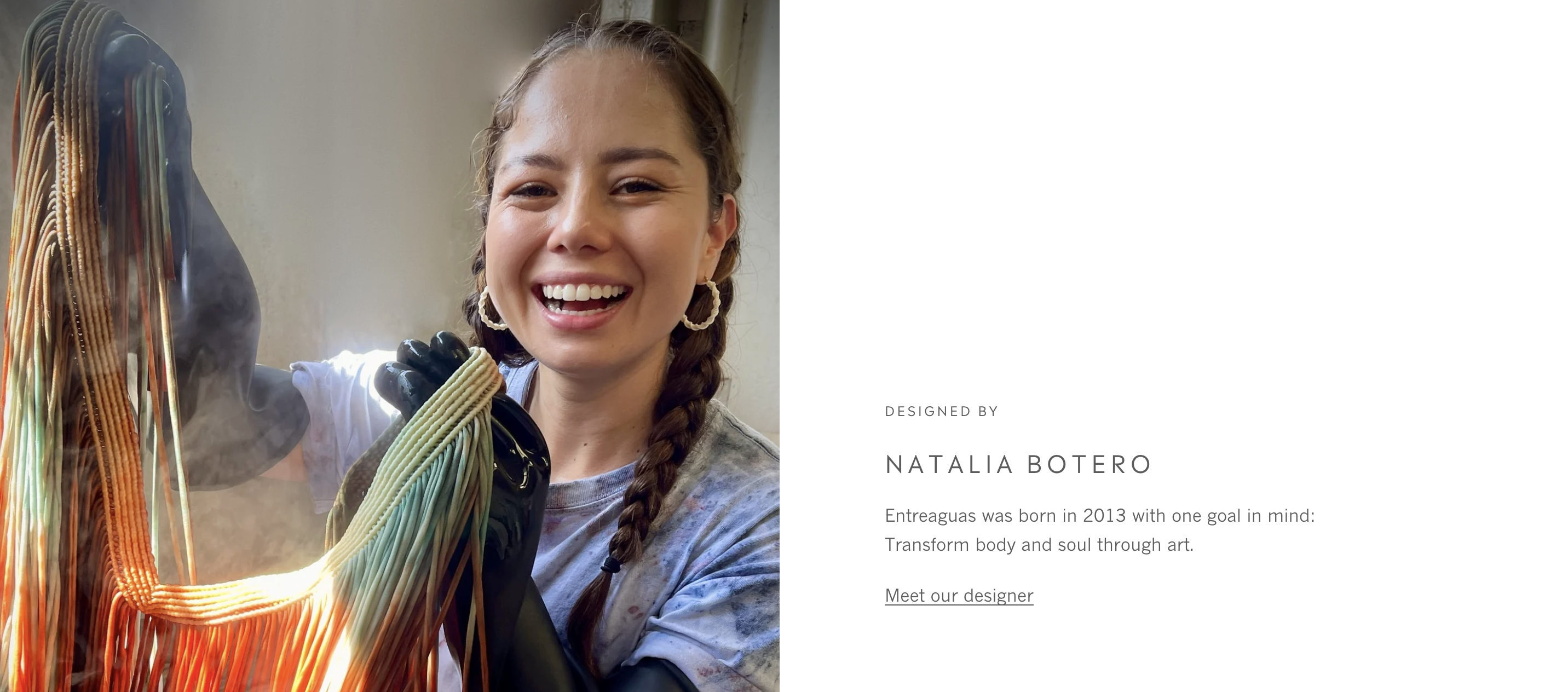
One of my favorite articles of clothing that I own is a bikini top that she made out of a picture that her dad took in the Amazon of a parrot.
I got it on sale for like $15. Handmade, very personal, and just a work of art if you ask me.
How much does Colombian swimwear cost:
So cheap. Like $60 for a 2-piece bikini, and Entreaguas clears out their store whenever they have new designs come through and they discount their stuff by like 80% so watch out for that.
Pro Tip – if you like a piece of swimwear but it doesn’t quite fit, ask the store if they offer alterations.
#11 Comuna 13 Art
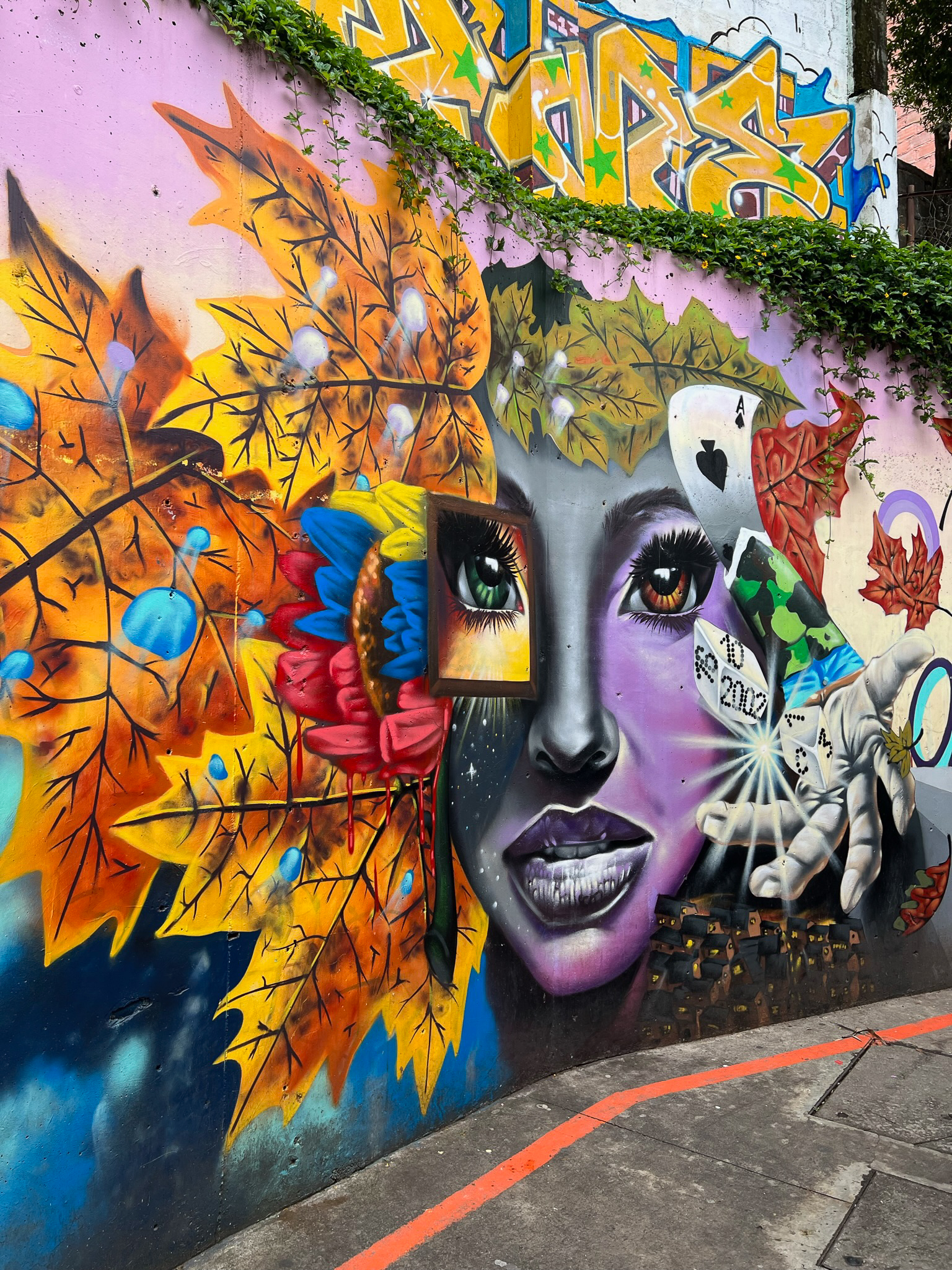
If you venture to Comuna 13 – and you should, but more about that here – this is a great place to get some really unique graffiti-style art. Graffiti in your house might not sound appealing (it certainly doesn’t to me) but hear me out.
Comuna 13 is a neighborhood once known for its high levels of violence and crime, and for being bombed by the Colombian government in just 2002, but which has undergone a remarkable revitalization through community initiatives and artistic expression. It’s famous for its colorful street art, which covers the entirety of the neighborhood, but in a really cohesive, tasteful way. The graffiti isn’t vandalization, but rather artistic expression that tells stories of hope, resilience, and the community’s journey from a troubled past to a brighter future.
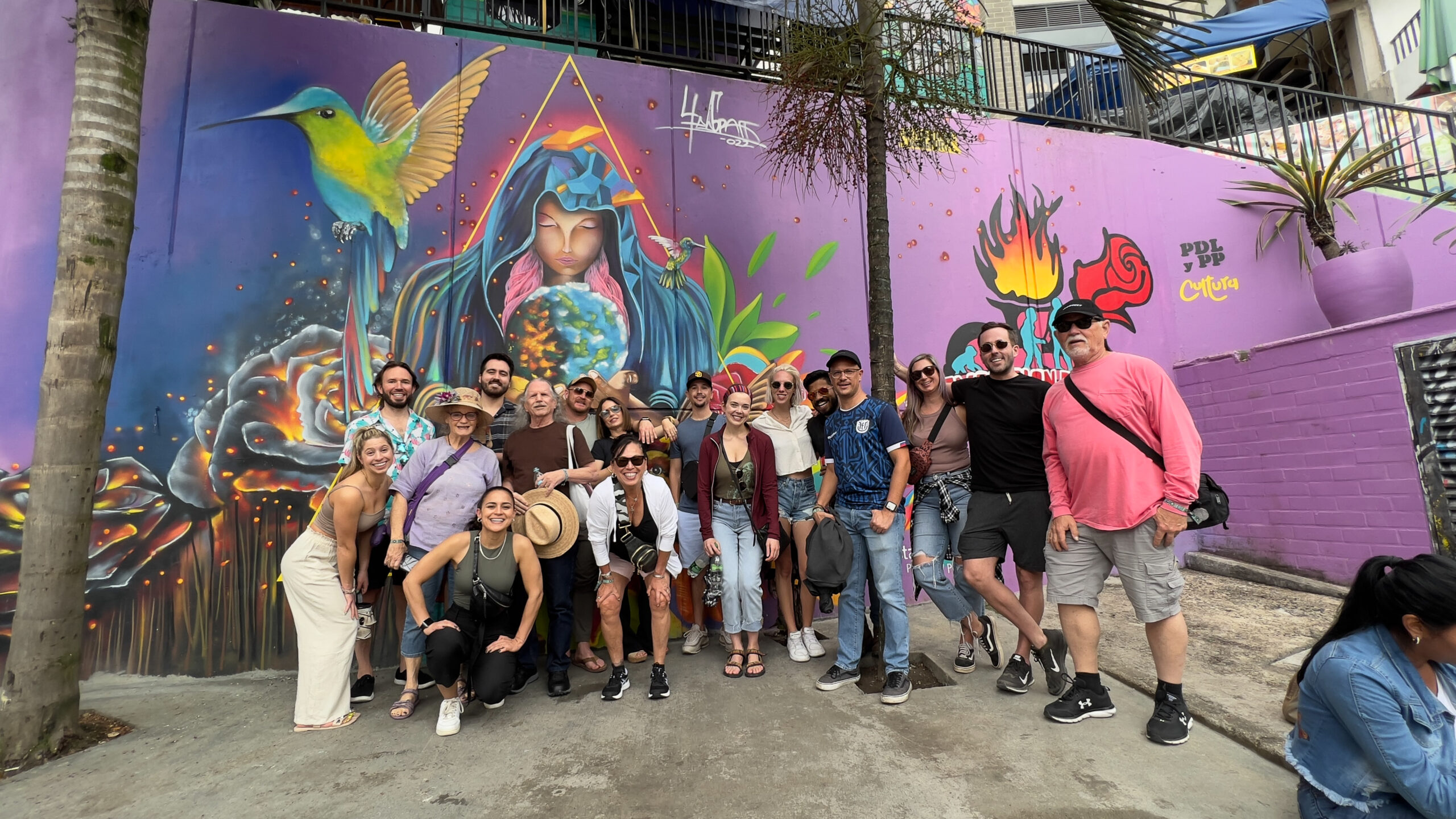
Even if you’re not a fan of street style (trust me, I hear you), you might like the art in Comuna 13. Here are some of my favorite pieces by my favorite artist:
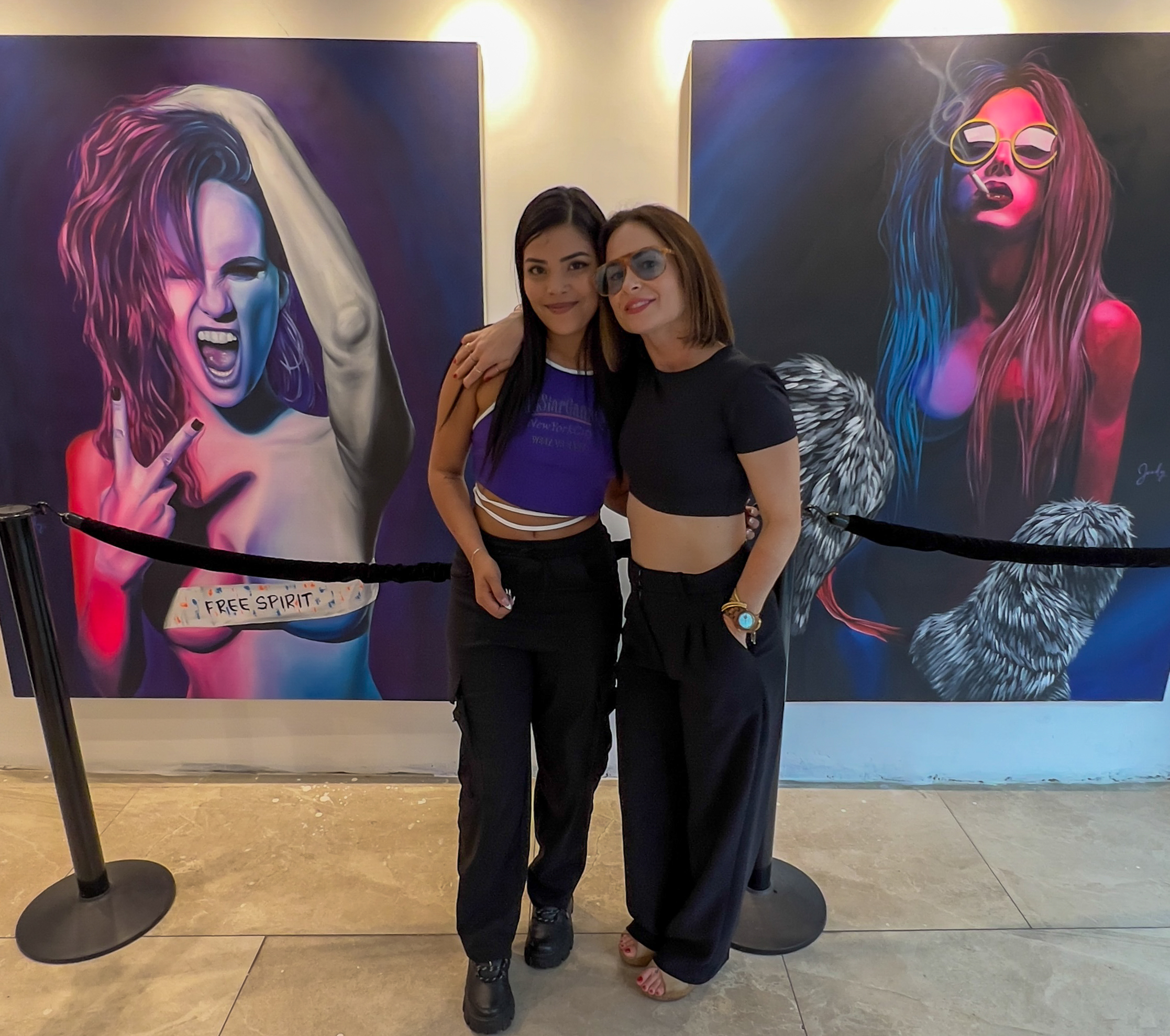
#12 Ruana
The ruana is a traditional Colombian poncho or cape that has been a part of the country’s Andean cultural heritage for centuries, and one of my favorite souvenirs to buy because they’re super practical. It can be made into a super stylish fashion statement – see the Mario Hernández ad below:
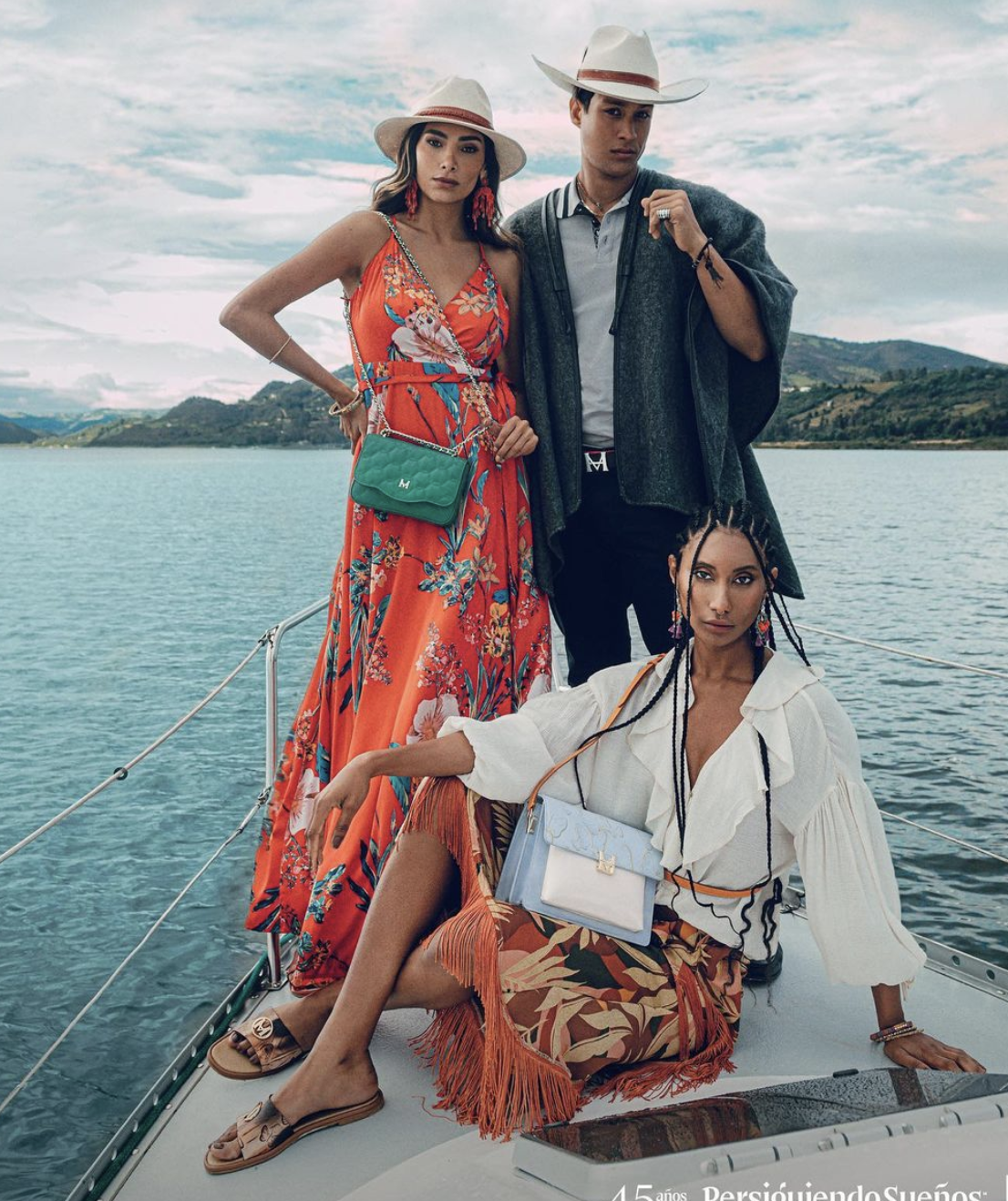
Or you can just drape it over yourself when you get cold during a Netflix sesh. It’s very practical.
This clothing item is traditionally made from wool, which is warm, and some of them come with a hood (depending on the region you’re in), which I LOVE.
How to buy a Colombian ruana:
Basically anywhere where you’re cold enough to wear a ruana – that region is probably where they come from. Just up the hill from Medellín, and other non-sea level places. In order to tell if you’re getting a falsie or the real deal, you can kind of guess by the price.
How much to pay for a Colombian ruana:
A $10 ruana is going to be synthetic fibers, probably not handmade, and probably won’t keep you as warm as a real one. If it’s more like $40 or $50, the tag says wool or alpaca, and the weaving looks intricate, I would assume it’s artisanal.
#13 Canvas Shoes
If you need some tennis shoes while you’re there, Canvas is good quality, comfortable, stylish, and inexpensive.
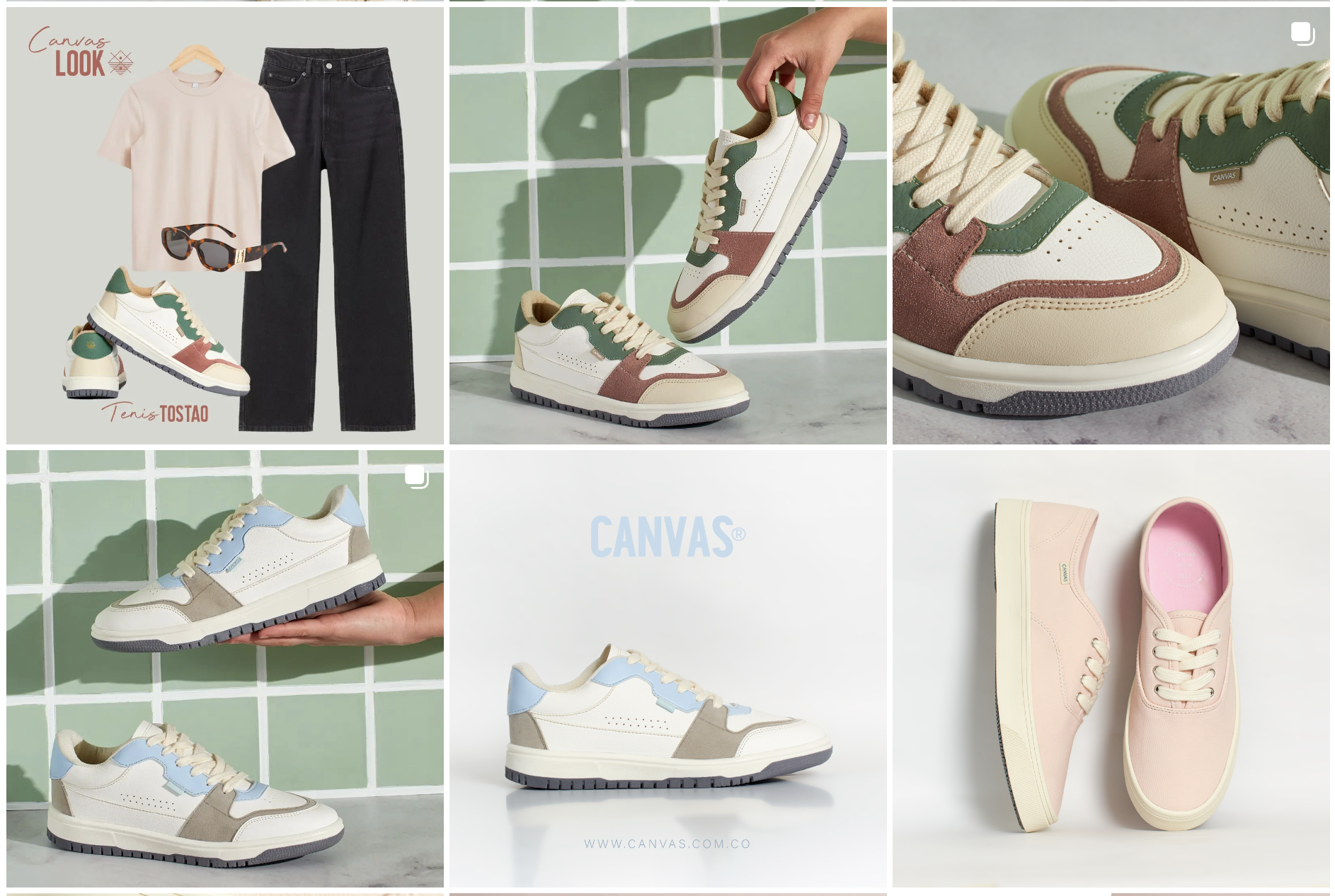
If you need some tennis shoes while you’re there, Canvas is good quality, comfortable, stylish, and inexpensive.
The brand was created by a 22-year-old design student with her dad. When he sold his leather company she asked him to recreate his business model using canvas, because she believed the material would resonate better with the younger market, as it’s more modern, less expensive, and vegan.
She was right, the company is now in 6 stores in Medellin and has been sold three times.
Happy Shopping!
As always, if you have any questions or want specific recommendations leave them in the comments and I’ll respond.
If you want to message me privately, I’ll respond on Instagram @Le_Gipset
This blog may contain affiliate links. If you make a purchase through these links, I may earn a commission at no additional cost to you. This helps support the blog and allows me to continue creating content. Thank you for your support.
Related Posts
Is Colombia safe in 2025? and what is the safest city?
I got my husband's identity stolen in Colombia last year, just 5 days after our wedding. His phone fell out of his pocket as we mad dashed in and...
Should You Do Your Destination Wedding in Colombia in 2025?
Destination weddings are becoming more popular as global access to tourism increases and American prices rise with it it. According to a report by...
21 Cool Things to do in Medellín, Colombia in 2025
I did a solo trip to Medellín planning to stay for 1 week. That’s how much time I thought I would need to execute the standard recommended tourist...

